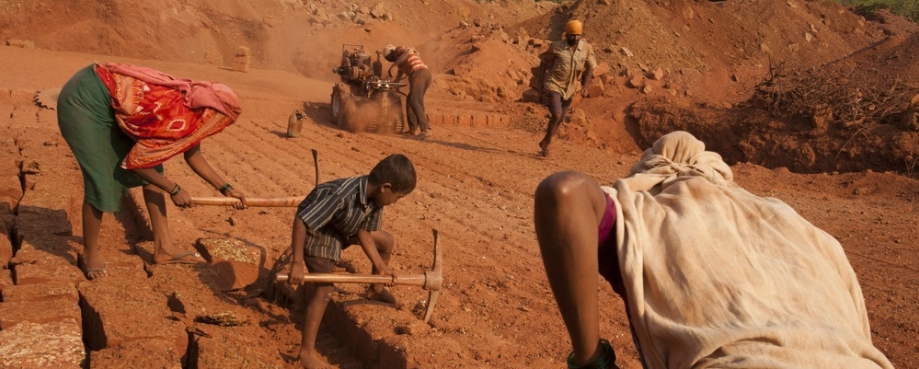
Stirling Smith, ETI trainer and blogger, takes you on a journey from India to China and Russia, in search of an ethically sourced granite worktop.
This blog always tries to innovate and be helpful. So, for the first time, here are some etiquette tips.
You are invited round to your friends for dinner, and they take you into the kitchen and show you their lovely new granite work top.
My tip is: don’t say “but aren’t these made by slaves?”
It might put a damper on the dinner party.
There are worse things than slavery
So, how likely is it that your friend’s granite worktop has been produced by slaves? Well there is plenty of evidence that bonded labour has been used in some south Indian quarries producing granite.
In a case just reported, three men have been sentenced to prison by an Indian court for holding quarry workers in bondage.
The workers were only rescued in 2012, so this is fast work for the Indian legal system which often makes Charles Dickens’ fictional Jarndyce and Jarndyce case seem fast-paced.
But, forced labour might not be the worst thing to happen in the stone industry in South India. In 2012, a rare and upright civil servant, exposed the breath-taking Tamil Nadu granite scam, as it has become known. There was wholesale illegal quarrying without licenses, through bribes, political connections.
Eventually an inquiry was held, although the official report is still under wraps. It’s estimated that the loss to the exchequer for unpaid licences and royalties was £2,000,000,000.
There was huge destruction of heritage sites, rivers, and water bodies.
Of course, there was child labour and forced labour, through debt bondage.
But there also seems to have been human sacrifice.
Yes, I know. It doesn’t seem credible. But if £2 billion was involved, why not?
Due diligence
Now the problems with South Indian granite are not exactly news. If you type in “Tamil Nadu granite scandal” you get about 366,000 results.
So, it was a bit disappointing, to say the least, when a few UK companies were found to be selling granite worktops sourced from south India last year and had to withdraw them in a hurry.
Their due diligence was lacking, to say the least.
China comes to the rescue?
But perhaps your dinner party host has done some of their own due diligence. And they tell you, “it’s from China, so we can be sure that no slave labour was involved”
Jump on a plane to Xiamen. The western name used to be Amoy, as in the famous sauce. If you go to the port, you will see acres upon acres of blocks of stone. You see, Chinese companies import blocks of stone from all over the world, process them and re-export them.
You can’t be 100% sure the granite kitchen worktop “from China” isn’t in fact from India.
Conditions in many Chinese stone processing factories are not the best. Although you can find one or two factories that seem fantastic. Full documentation, excellent policies, robust evidence that there is no child labour.
Until you start to ask to meet the department in charge of buying in stone. Then they don’t seem to be available.
Russian lessons
The Chinese have learned a lesson from Prince Potemkin. He was Catherine the Great’s Prime Minister. When distinguished foreign visitors came to Russia, expecting filth and squalor, he arranged for them to be taken to neat well laid-out villages, where the peasants seemed well-dressed, polite and sober.
These were called Potemkin villages.
In the days of the Soviet Union, foreign visitors were taken to the same kind of establishments: Potemkin collective farms.
And we now have Potemkin factories.
Now, I don’t suggest that Chinese stone processing factories use slave labour. There are just a number of practices that do not quite match the standard of the ETI Base Code.
In fact, the Indian stone processing factories do not use slave labour either.
The problems tend to be lower down the supply chain - in the quarries.
Complex supply chains
Having said that, I have seen prison labour in Vietnamese factories processing limestone. That might be classified as slavery. I explained the technicalities of this in an old blog here. Very few businesses would be able to do the checking to ensure prison labour was not slavery.
Stone supply chains can be quite complex. In some countries the same entity must own the quarry and the stone processing facility, in other countries it’s different. And stone is extracted in a variety of ways, depending on the geology.
And it’s not just China that imports blocks of stone and then re-exports it. You would have thought Italy was a safe bet. Much of the modern stone industry started there. But they take block from dodgy places, like Angola, process and re-export it.
It’s almost impossible for a UK consumer to know all about the supply chain of their granite worktop.
But it isn’t impossible for UK retailers. After all, anybody can type a few words into a search engine, and follow up what they find.
I don’t want to spoil your meal. So, head back to your dinner party and chat about the wine, or the delicious recipe.
In the interests of transparency, Stirling would like to point out that he undertakes social audits of stone producing facilities for Marshalls PLC, an ETI member. Marshalls does not source or supply kitchen worktops. Marshalls is one of four ETI stone company members which also includes CED, Hardscape and Natural Paving seeking to improve working conditions in quarries and stone processing yards as part of our ETI Rajasthan stone sector working group.
